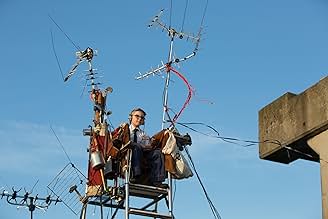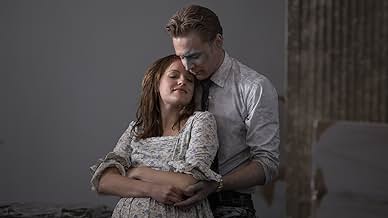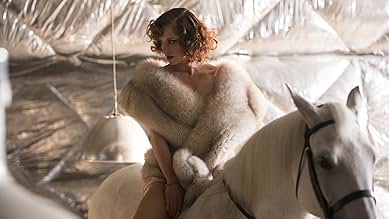CALIFICACIÓN DE IMDb
5.5/10
47 k
TU CALIFICACIÓN
Las vidas de los vecinos de un edificio se salen de control.Las vidas de los vecinos de un edificio se salen de control.Las vidas de los vecinos de un edificio se salen de control.
- Premios
- 6 premios ganados y 14 nominaciones en total
Dan Renton Skinner
- Simmons
- (as Dan Skinner)
- Dirección
- Guionistas
- Todo el elenco y el equipo
- Producción, taquilla y más en IMDbPro
Opiniones destacadas
Life for the residents of a tower begins to run out of control.
High-Rise is the adaptation of J.G. Ballard's 1975 novel, directed by Ben Wheatley and starring Tom Hiddleston as Dr. Robert Laing. I didn't really know what to expect from this movie, as I did not read the book, so I came at it from a fresh perspective. This film is a quasi-period piece, which is not completely irrelevant to a Britain in which buy-to-let apartment block exist. It is a blank, affectless world with a certain type of sci-fi and satirical Englishness. This tale is quite a bizarre, sleek, seedy and mad spectacle.
If Jeremy Iron's roles in Dead Ringer and M.Butterfly provide a roundabout link to Cronenberg, so does a med-school scene where the skin of a cadaver's head is peeled away in a kind of metaphor for society's thin surface. That and his wife parading around like some postmodern Marie Antoinette, on a horse. In fact, the core cast is brilliant. Tom Hiddleston is terrifically nonchalant, giving a great performance as the lead character: dry and self-possessed. A charming and charismatic performance with a hint of internal sadness. Plus, Miller makes bright work of Charlotte.
Mark Tildesley's lavish production design ranges from mouldering fruit bowls to posh parties decadent enough to cause a French Revolution. Decadence, despair and violence are all around, in a kind of ongoing erotic catastrophe. The screenwriters played out this scenario as a retro-futuristic sci-fi allegory - Ballard was writing the near-future in the mid-70s: Wheatley and Jump smartly stick with a period they know well. I loved the film's refusal of "normal" storytelling, bold visual style with these gorgeous shots and vibrant colours. Combined with the editing, shots have a dream- like surreal quality, a colourful beginning contrasted by the end with a dark shadow feeling.
The soundtrack was great, there is two scenes especially where there's this string quartet playing an ABBA song and later on it gets remix, it was probably one of my favourite scenes - as well as this very interesting naked scene on the balcony that might also be of some interest to some of you. Finally, for some High-Rise could be frustrating and the specific references to Margaret Thatcher era doesn't quite work as a whole.
Overall, High-Rise has a vibe of "you want to look away but you really can't". This film is an excellent allegory for society, it lingers in the mind with some strong visuals, good soundtrack and more than decent acting.
High-Rise is the adaptation of J.G. Ballard's 1975 novel, directed by Ben Wheatley and starring Tom Hiddleston as Dr. Robert Laing. I didn't really know what to expect from this movie, as I did not read the book, so I came at it from a fresh perspective. This film is a quasi-period piece, which is not completely irrelevant to a Britain in which buy-to-let apartment block exist. It is a blank, affectless world with a certain type of sci-fi and satirical Englishness. This tale is quite a bizarre, sleek, seedy and mad spectacle.
If Jeremy Iron's roles in Dead Ringer and M.Butterfly provide a roundabout link to Cronenberg, so does a med-school scene where the skin of a cadaver's head is peeled away in a kind of metaphor for society's thin surface. That and his wife parading around like some postmodern Marie Antoinette, on a horse. In fact, the core cast is brilliant. Tom Hiddleston is terrifically nonchalant, giving a great performance as the lead character: dry and self-possessed. A charming and charismatic performance with a hint of internal sadness. Plus, Miller makes bright work of Charlotte.
Mark Tildesley's lavish production design ranges from mouldering fruit bowls to posh parties decadent enough to cause a French Revolution. Decadence, despair and violence are all around, in a kind of ongoing erotic catastrophe. The screenwriters played out this scenario as a retro-futuristic sci-fi allegory - Ballard was writing the near-future in the mid-70s: Wheatley and Jump smartly stick with a period they know well. I loved the film's refusal of "normal" storytelling, bold visual style with these gorgeous shots and vibrant colours. Combined with the editing, shots have a dream- like surreal quality, a colourful beginning contrasted by the end with a dark shadow feeling.
The soundtrack was great, there is two scenes especially where there's this string quartet playing an ABBA song and later on it gets remix, it was probably one of my favourite scenes - as well as this very interesting naked scene on the balcony that might also be of some interest to some of you. Finally, for some High-Rise could be frustrating and the specific references to Margaret Thatcher era doesn't quite work as a whole.
Overall, High-Rise has a vibe of "you want to look away but you really can't". This film is an excellent allegory for society, it lingers in the mind with some strong visuals, good soundtrack and more than decent acting.
JG Ballard's dystopian science fiction novels have long been regarded as being unfilmable. Ironically it was Steven Spielberg who first made a film of one of his books, the autobiographical Empire of the Sun which was also more conventional.
In High Rise the building clad in some kind of neo 1970s decor is really the star as it represents the social strata. A society in decay. The film opens where there has been a total nihilistic breakdown amongst the occupants where we see a man roasting a dog's leg before we jump back three months earlier.
Dr Robert Laing (Tom Hiddleston) is a middle class doctor, almost an every-man who is at ease both going up and down the social classes in the tower block. He is helped by Charlotte Melville (Sienna Miller) a sexy neighbour who helps Laing get to the upper floors where tastes are more refined. Better parties, music, swimming pool and restaurants for example.
Richard Wilder (Luke Evans whose get up reminds me a lot of actor Stanley Baker) is a truculent documentary maker who lives near the ground floor with his wife and children amongst the rest of the block's poorer tenants. Wilder is aware and resentful of the inequality that exists in building. He has to put up with electricity outages, lifts not working properly, inferior restaurants, shops, parties. Wilder wants to expose the building's architect Anthony Royal (Jeremy Irons) who lives on the top floor and he also happens to be Laing's occasional squash partner.
As we head towards hedonism, one-upmanship, sex fuelled violence the narrative structure of the film breaks down. The descent into madness is too rapid as Laing suddenly starts to paint his room and himself. The film becomes disjointed although we see some of the upper floor residents who wish to Balkanise the lower floors and re-organise the place more to their benefit.
It is as the novel was just too big and intricate to just chew off and director Ben Wheatley did not have the budget and resources to do it justice.
The film ends with the words of Mrs Margaret Thatcher former Prime Minister of Britain who did so much to ramp up the divisions between rich and poor in the 1980s.
In High Rise the building clad in some kind of neo 1970s decor is really the star as it represents the social strata. A society in decay. The film opens where there has been a total nihilistic breakdown amongst the occupants where we see a man roasting a dog's leg before we jump back three months earlier.
Dr Robert Laing (Tom Hiddleston) is a middle class doctor, almost an every-man who is at ease both going up and down the social classes in the tower block. He is helped by Charlotte Melville (Sienna Miller) a sexy neighbour who helps Laing get to the upper floors where tastes are more refined. Better parties, music, swimming pool and restaurants for example.
Richard Wilder (Luke Evans whose get up reminds me a lot of actor Stanley Baker) is a truculent documentary maker who lives near the ground floor with his wife and children amongst the rest of the block's poorer tenants. Wilder is aware and resentful of the inequality that exists in building. He has to put up with electricity outages, lifts not working properly, inferior restaurants, shops, parties. Wilder wants to expose the building's architect Anthony Royal (Jeremy Irons) who lives on the top floor and he also happens to be Laing's occasional squash partner.
As we head towards hedonism, one-upmanship, sex fuelled violence the narrative structure of the film breaks down. The descent into madness is too rapid as Laing suddenly starts to paint his room and himself. The film becomes disjointed although we see some of the upper floor residents who wish to Balkanise the lower floors and re-organise the place more to their benefit.
It is as the novel was just too big and intricate to just chew off and director Ben Wheatley did not have the budget and resources to do it justice.
The film ends with the words of Mrs Margaret Thatcher former Prime Minister of Britain who did so much to ramp up the divisions between rich and poor in the 1980s.
This film tells the life of the residents in a high rise apartment block in the UK, where the hierarchy and the corresponding rights of the residents are highly rigid.
"High-Rise" is certainly trying to be a metaphor for a dysfunctional society, but exactly what it is trying to mirror, I don't know. The plot is very confusing, and basically the lives of the residents and also the plot itself descend into chaos. Maybe it's trying to tell the relationship between the oppressors and the oppressed? Or is it trying to highlight the importance of elitism, and that the masses should not have power? The central theme of the film is so unclear, that I could not get into the story at all. I find it a pointless and confusing mess.
"High-Rise" is certainly trying to be a metaphor for a dysfunctional society, but exactly what it is trying to mirror, I don't know. The plot is very confusing, and basically the lives of the residents and also the plot itself descend into chaos. Maybe it's trying to tell the relationship between the oppressors and the oppressed? Or is it trying to highlight the importance of elitism, and that the masses should not have power? The central theme of the film is so unclear, that I could not get into the story at all. I find it a pointless and confusing mess.
I had the pleasure of viewing High-Rise at a recent film festival. I went in with high expectations, which gave way to boredom and the anticipation of the end of the showing.
The actors absolutely fulfilled all expectations. The performances are all highly nuanced and look natural, rather than put on. Hiddleston goes above and beyond to give one of the arguably best performances of his career. The mise-en-scene of each scene is meticulously crafted and beautifully shot.
So what, exactly, tipped high expectations into boredom?
For one, the film never does come together, never gives off the feeling of a cohesive whole, but rather of a series of vignettes. Each vignette is, of course, beautifully shot, but the disconnect they cause makes it impossible to empathize with any of the characters.
Additionally, suspension of disbelief is near impossible. Why do the characters make the choices they do? What drives them to this madness?
Overall, I would recommend this piece to very loyal fans of any of the actors or to cinephiles with a high degree of patience.
6.5/10
The actors absolutely fulfilled all expectations. The performances are all highly nuanced and look natural, rather than put on. Hiddleston goes above and beyond to give one of the arguably best performances of his career. The mise-en-scene of each scene is meticulously crafted and beautifully shot.
So what, exactly, tipped high expectations into boredom?
For one, the film never does come together, never gives off the feeling of a cohesive whole, but rather of a series of vignettes. Each vignette is, of course, beautifully shot, but the disconnect they cause makes it impossible to empathize with any of the characters.
Additionally, suspension of disbelief is near impossible. Why do the characters make the choices they do? What drives them to this madness?
Overall, I would recommend this piece to very loyal fans of any of the actors or to cinephiles with a high degree of patience.
6.5/10
There is some intense hatred for High-Rise, which I think comes from people expecting something very different to what they found. So I'm going to try and tell you what to expect without any spoilers.
A lot of people will find this movie hard to relate to because it has anti-heroes and is driven by concept rather than character - its pacing is guided more by the ideas it wishes you to consider than the emotions it wants you to experience. Another swathe of viewers will be put off because it offends their politics, and sociology and politics are at the core of this movie. Ballard made some observations about human nature, the which Jump and Wheatley relate to the politics of their own generation. The majority of High-Rise's observations are pessimistic to say the least; those overly sensitive to the observations' bleakness, or who can't relate to their context may not find much here.
But if you can immerse yourself into the film's style, enjoy the outstanding performances and cinematography, and enjoy decrypting J.G.Ballard's metaphors through Ben Wheatley and Amy Jump's lens, there is a lot here for you.
My only gripes are 1) that it didn't show at any cinemas within a reasonable distance from me, and 2) having Abba stuck in my head (although vastly reinvented versions appear in the movie, it is the original song which burrows into my ear like a parasitic worm).
A lot of people will find this movie hard to relate to because it has anti-heroes and is driven by concept rather than character - its pacing is guided more by the ideas it wishes you to consider than the emotions it wants you to experience. Another swathe of viewers will be put off because it offends their politics, and sociology and politics are at the core of this movie. Ballard made some observations about human nature, the which Jump and Wheatley relate to the politics of their own generation. The majority of High-Rise's observations are pessimistic to say the least; those overly sensitive to the observations' bleakness, or who can't relate to their context may not find much here.
But if you can immerse yourself into the film's style, enjoy the outstanding performances and cinematography, and enjoy decrypting J.G.Ballard's metaphors through Ben Wheatley and Amy Jump's lens, there is a lot here for you.
My only gripes are 1) that it didn't show at any cinemas within a reasonable distance from me, and 2) having Abba stuck in my head (although vastly reinvented versions appear in the movie, it is the original song which burrows into my ear like a parasitic worm).
¿Sabías que…?
- TriviaThe film includes two interpretations of the ABBA song "SOS" - one by the film's composer Clint Mansell and the other by Portishead. "SOS" was released in 1975. The same year as the novel "High-Rise" JG Ballard.
- ErroresWhen Laing cuts into the human head during the pathology / dissection scene, blood is shown flowing from the fresh incision. This is medically impossible, as blood ceases to flow once a person is deceased; even more so when the head has been long since detached from the rest of the body.
- ConexionesFeatured in Film '72: Episode #45.4 (2016)
- Bandas sonorasSundance Chant
Written by Conny Velt
Published by Neue Welt Musikverlag GMBH & Co. KG
A Warner / Chappell Music Company
Performed by Gila
Licensed courtesy of Gila
Selecciones populares
Inicia sesión para calificar y agrega a la lista de videos para obtener recomendaciones personalizadas
Detalles
- Fecha de lanzamiento
- Países de origen
- Sitios oficiales
- Idioma
- También se conoce como
- High-Rise
- Locaciones de filmación
- Productoras
- Ver más créditos de la compañía en IMDbPro
Taquilla
- Total en EE. UU. y Canadá
- USD 346,472
- Fin de semana de estreno en EE. UU. y Canadá
- USD 79,887
- 15 may 2016
- Total a nivel mundial
- USD 4,289,074
- Tiempo de ejecución1 hora 59 minutos
- Color
- Mezcla de sonido
- Relación de aspecto
- 2.35 : 1
Contribuir a esta página
Sugiere una edición o agrega el contenido que falta





























